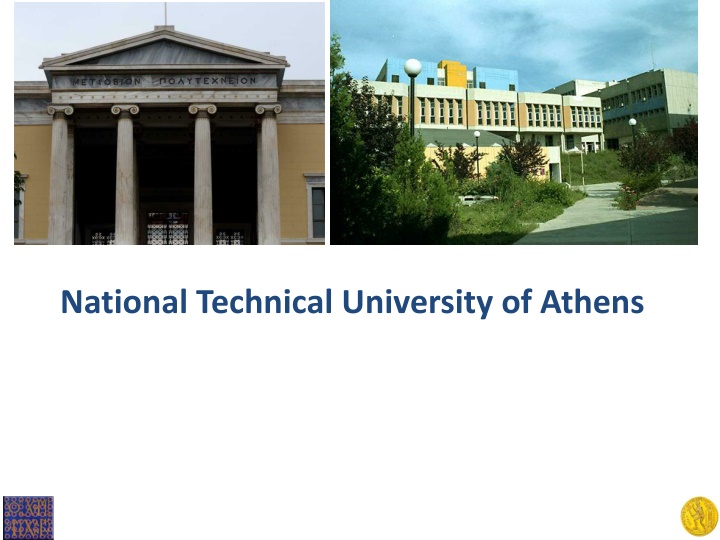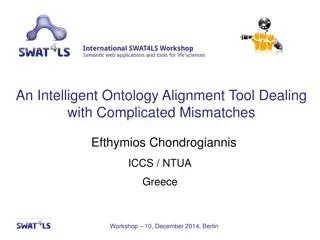
National Technical University of Athens: Overview and Programs
National Technical University of Athens (NTUA) is the oldest technical university in Greece, founded in 1837. It offers a comprehensive range of engineering programs, operates extensive laboratories, and provides valuable services to the country. With a focus on solid academic background, NTUA empowers students with quality education and opportunities for postgraduate specialization and international exchange programs.
Download Presentation

Please find below an Image/Link to download the presentation.
The content on the website is provided AS IS for your information and personal use only. It may not be sold, licensed, or shared on other websites without obtaining consent from the author. If you encounter any issues during the download, it is possible that the publisher has removed the file from their server.
You are allowed to download the files provided on this website for personal or commercial use, subject to the condition that they are used lawfully. All files are the property of their respective owners.
The content on the website is provided AS IS for your information and personal use only. It may not be sold, licensed, or shared on other websites without obtaining consent from the author.
E N D
Presentation Transcript
The National Technical University of Athens (NTUA) is the oldest Technical University, founded in 1837. Today, it is structured according to the continental European system for training engineers, with an emphasis on solid background. The duration of courses leading, after the acquisition of 300 credit units to a Diploma, of Master s level, is five years. NTUA consists of the following 8 Engineering Schools: Civil, Mechanical, Electrical, Architecture, Chemical, Rural and Surveying, Minong and Metallurgical, Naval and the School of Applied Mathematical and Physical Sciences. There are in total, 40 Departments and 193 thoroughly equipped Laboratories and Workshops in the NTUA s Schools, dealing with specific scientific fields.
NTUA operates many of its Laboratories also as "service laboratories", which provide measurements and all specialized services in general, within the framework of its technological competence, which can be useful for the development of the country. NTUA is currently estimated to have a total number of 200.000 volumes of books coming from purchases, donations and research projects, and over 80.000 volumes of scientific reviews. Books and reviews are available either from the Central Library of the Institution or from the Libraries of the Faculties, the Departments and the Labs. At NTUA, there is appreciable know-how into all topics of Physical and Applied Sciences, with emphasis to disciplines such as Informatics, Materials, Environment etc. expert advice, tests and
The personnel include more than 700 people as academic staff, 140 scientific assistants and 260 administrative and technical staff. The total number of NTUA employees is about 1350. The total number of undergraduate students is about 8500 and the graduate students 1500. There are currently 19 Departmental or Inter-Departmental Postgraduate Courses, leading to the respective "Post Graduate Specialisation Diploma", with a minimum duration of 17 months. After the acquisition of the "Post Graduate Specialisation Diploma", the student can proceed towards submitting a Doctorate Thesis. The students' exchange programmes give students the opportunity to attend courses in another European country, for a period of time that can range from three months to one academic year. During their stay abroad, the students have to attend courses that correspond to the ones of their normal semester, and pass the exams for them. These courses are recognised by N.T.U.A. when the student returns to Greece.
The role of Chemical Engineer in the Industry - Technology - Financial & - Social parameters Raw Products materials Physical, Chemical and Biological Processes By- Energy products Reuse Recycling Chemical Engineers work on the synthesis, design, scale-up, automation and optimization of physical, chemical and biological processes for the transformation of raw materials to useful industrial products with the desired properties.
School Structure: Departments - Laboratories Dept. of Synthesis and Development of Industrial Processes Dept. of Materials Science and Engineering Dept. of Process Analysis and Plant Design Dept. of Chemical Sciences Inorganic Materials Technology Lab. General Chemistry Lab. Industrial and Energy Economy Lab. Physical Chemistry Lab. Biotechnology Lab. Inorganic and Analytical Chemistry Lab. Thermodynamics and Transport Phenomena Lab. Materials Science and Engineering Lab. Polymer Technology Lab. Fuels and Lubricants Technology Lab. Chemical Process Engineering Lab. Organic Chemistry Lab. Design and Process Analysis Lab. Food Chemistry and Technology Lab. Organic Chemical Technology Lab. 15 Labs
Units Units Orizontal Unit Computational Fluid Dynamics Unit Automatic Control and Informatics Unit Environment and Quality of Life Lab. Solar Engineering Unit Environment and Energy Management Research Unit Hydrocarbon and Biofuels Process Engineering Unit Lab. Unit of Nanoengineering and Nanotechnology Semi-Industrial Unit of Chemical Engineering Unit of Environmental Science and Technology Instrumental Methods of Analysis - Environment Polymer Apps Group .
Research activities in the School of Chemical Engineering Research activities in the School are focused on cutting edge areas, on the national and international level, with significant results in terms of handling of research projects and publication of papers in the international scale. These achievements are due to: - the great efforts of our Staff, - the complete laboratory infrastructure, enhanced by the particular reputation of the School and the entire University in the field of research - The research work is mainly produced by the contribution of young scientists, basically, PhD candidates and post-docs. Common target of the current research attempts is the optimization of energy consumption and the sustainability practices for the environment.
Research activities relevant to Leather Technology Many research projects on the treatment of Leather or its by-products, have been run in the School and numerous papers have been published. Some characteristic titles are: Andreopoulos A.G. and Tarantili P.A., Waste leather particles as a filler for poly(vinyl chloride) plastisols, Journal of Macromolecular Science - Pure and Applied Chemistry 2000, A37(11), pp. 1353-1362 Babanas K., Tarantili P.A. and Andreopoulos A.G., Plasticized Poly(vinyl chloride) Filled with Waste Leather Particles, Journal of Elastomers and Plastics2001, 33, pp. 72-85. Research project no 62145500 Composite Materials made of Polymers and Leather Research project no 6231600, Leaching of collagen peptide from chrome containing leather waste, for the preparation of innovative finishing products
Studies at the School of Chemical Eng. NTUA We are about to renew our under graduate Program of studies. The current Program has the following profile: Duration of Studies: 10 semesters Diploma Thesis Courses Practical training Mandatory (40) It is prepared by the final semester students in a lab. and subject of their choice, under the supervision of a School member who teaches the most relevant course. Takes place in industries or research establishments for 5 weeks at the beginning of the 9th semester Electives (9) Mandatory of Directions (5) Process Engineering Materials Industries of Organic Chemicals- Polymers Inorganic Processes Food-Biotechnology
Teaching Procedures Lectures of academic teachers Tutoring (exercises etc) Laboratory training Educational visits Seminars from invited speakers Exercises to be resolved by the students Homework and papers to be prepared by the students Mid-term exams Final exams Teaching and Research staff: 63 Laboratory Teaching staff: 58 Technical Lab. Staff: 7 Secretariat: 7 + 6
Perspectives and the future of Chemical Engineers - Besides the basic aim of education, which is: the design of plants, processes and products, emphasis is also given to the following: Management and Economics There is a recognized need of combining the engineering studies with financial and management aspect, in order to provide to the students administrative capabilities Aiming at the safe design of processes and industrial plants, the prevention of industrial accidents and limitation of their impact Safety and Hygiene The automation, the process control and data processing, are gaining continuously growing significance in the Chemical Industry Process control Quality control of products and processes The quality control and assurance of materials and processes is an additional high priority topic for Chemical engineers.
Other Options in the School of Chemical Engineering Advisor (professor): the main scope is to facilitate the academic performance of students and their support for efficiently facing the problems of studies and everyday s life Program ERASMUS+: Provides the option of students mobility for studies or practical training to European Universities, with the appropriate scholarship
Post graduate programs The Departmental or Inter-Departmental Postgraduate Courses, are leading to the respective "Post Graduate Specialization Diploma", with a minimum duration of 17 months. Programs offered by the School: Materials Science and Engineering Computational mechanics Protection of Monuments, Sites and Complexes Direction B Programs offered by other Departments: Automation Systems Athens Postgraduate Program in Business Administration Energy Production and Managent Environment and Development Mathematical Modeling in Modern Technologies and Economics Chemistry Education and New Educational Technologies Postgraduate Course on Industrial Management
Perspectives and the future of Chemical Engineers - New topics for growth: Design and production of high-tech and high added value products - structure, properties and industrial production techniques (plastics, leather etc) - New materials (e.g. environmentally friendly) - standardization, quality control, recycling Food chemistry and technology - Thermomechanical processes (drying, freezing conservation, etc) - Upgrading of by-products of agricultural industries Biotechnology - Use of chemical engineering methods to the related processes - Application in the field and food and drinks, drugs, chemicals, environment etc
Perspectives and the future of Chemical Engineers. - New topics for growth : Technologies for environmental and energy management Proper and ecological use of energy Development of environmental friendly processes, methodologies and products Technologies of treatment of liquid and gaseous industrial waste, materials recycling etc. Development of technologies for conservation of cultural heritage With emphasis on the specific aspects of conservation and promotion of monuments and other items of art. Holy tomb in Jerusalem Informatics and related products The use of computers plays an increasing role on the analysis and interpretation of data, the design, control and automation of industrial plants
Everydays Life at the NTUA Departments Computer Center Reading Room Central Library
Various Activities in the NTUA Mousical Sector Dancing Sector Theatrical group Sports Center
National Technical University of Athens School of Chemical Engineering
Career prospects of Chemical Engineers Production Quality Control Research and Development (R&D) Logistics Marketing Industry Laboratories of measurements, Analyses and Research Consulting Planning and project construction Market promotion of products and equipment of the Chemical industry Servicing in the Public Sector Education

